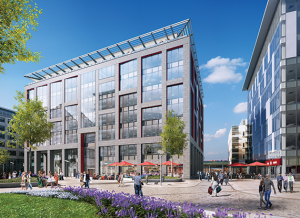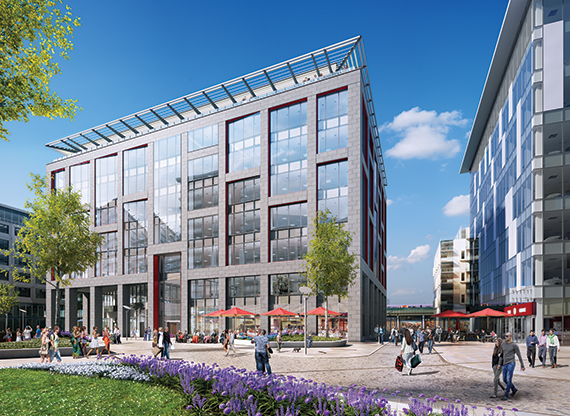 Despite the North West attracting £25bn of corporate firepower, Manchester’s struggle to pull in the biggest firms is proving a conundrum. So what is the solution?
Despite the North West attracting £25bn of corporate firepower, Manchester’s struggle to pull in the biggest firms is proving a conundrum. So what is the solution?
The North West’s big plcs are valued at about £25bn, up £2bn on last year. Some, such as Outsourcery and AO.com, had a stellar year. Long-established business residents, including the global headquarters of PZ Cussons, and the UK bases of Kellogg’s, Adidas and Siemens, head a formidable list of firms.
Yet £25bn of corporate firepower barely registers in Manchester’s 1.3m sq ft city centre office market. Match up the list of regional-headquartered plcs with the list of Manchester dealmakers and you won’t find much overlap. Some years, no overlap.
It looks like a puzzle, but – according to local business analysts and the city’s property brains – it has a surprisingly straightforward solution.
Chris Robertson, partner in charge of plc activity at Deloitte in the North West, watches the local corporate scene with eagle eyes. “In order to become a scale plc – in the FTSE 100, 250 or 350 – you have to be making huge profits. For the FTSE 250 you are probably turning a profit of £100m a year, and there are very few businesses that can make that level of profit on the strength of their domestic geography in the North West.
“These aren’t really North West businesses – they aren’t even UK-centric – with the exception of the big utility companies such as United Utilities. Their home region is of relatively modest significance compared with global earnings.”
The message seems clear: the region’s big corporates are more interested in the world than in their own backyard.
So they have no influence on the Manchester property market? According to Robertson – and to city surveyors – their influence is powerful and enduring, just difficult to spot.
Robertson points to Deloitte’s Manchester office as a case in point. With a headcount of 600 and occupancy of 68,500 sq ft at 2 Hardman Street in Spinningfields, it is one of the mainstays of the city centre’s office scene. Deloitte – and every other accountancy, legal, financial, insurance and banking operation represented in the city – largely depends on corporates for income and raison d’être.
“The corporates matter enormously,” he says. “For us at Deloitte it matters, because they are our clients, but also for recruitment. The big names in the region are appealing – people want to work with the big names, so they come to work for us. So the local corporates affect the property market through the professionals that work with them.
“The fact that we have a £25bn corporate sector in the region means we also get the professional infrastructure that clusters around the plcs,” Robertson adds. “And that is good for other aspiring businesses, for whom all these services are on the doorstep.”
More tangibly, evidence is growing that the corporates are indeed planning to take additional Manchester floorspace. Enquiries for call centres and back-office space are said to be growing. Agents dispute the exact figures – and jealously guard the names of the firms concerned – but back-of-the-envelope calculations suggest about 1m sq ft could be at stake (see below).
Robertson says: “The plcs have stored up capital after four or five years during which they reined in their strategic decisions. Chief financial officers are now thinking about more expansive strategies. Mergers and acquisitions will probably be top of their list, then new technology, but our plc clients know there can be massive benefits from consolidating offices.”
Mike Hawkins, partner at Colliers International, says: “North West corporates, from Manchester United and JD Sports to Boohoo and Pets at Home – contribute to the Northern Powerhouse and raise the Manchester profile. But they are cost-effective businesses and they do not splash the cash on property.”
If the corporates begin to move in the Manchester office market, the likely winners will be schemes on the fringe of the city’s prime core. Totaljobs Group signed 5,147 sq ft at Carlyle’s Piccadilly Place – a small down-payment on corporate deals to come but indicative, says GVA director Chris Cheap, of the kind of locational choices the corporates will make.
He says: “The big corporates are looking at Manchester for call centres, but they are not looking to pay £32 per sq ft or the highest prices for office space. Although take-up of office space in Manchester city centre was at record levels last year, it was underpinned by deals in good, decent city centre space below £26 per sq ft.”
Office schemes including English Cities Fund’s One New Bailey and Ask’s Greengate Exchange are expected to benefit. Conveniently, ECF is preparing for growth, acquiring a dated 1970s block next to its 125,000 sq ft speculative scheme. The site will provide the second phase, following the completion of the first block in May 2016.
The corporates contribute enormously to Manchester’s economic strength – and they could soon be contributing more to the city’s go-getting property market.
Forget re-shoring, think north-shoring
Dozens of UK corporates are said to be planning to return call centres and back offices from overseas, and to install them in Manchester. Plenty more are consolidating local and national offices in the city. As much as 1m sq ft could be involved.
Mike Hawkins, partner at Colliers International, is advising a clutch of firms now sniffing out possibilities in the Manchester market. “We are representing five of the FTSE top 100, and three more of the top 250, all of which are looking to expand and consolidate in the near future in the North West. We are evaluating options and will proceed over the next nine months,” he says.
If all these requirements land, that could mean deals totalling 500,000 sq ft.
CBRE is also advising a long list of corporate clients in the region. Manchester managing director John Ogden says that if they all decided to move, it could create another 350,000 sq ft to 500,000 sq ft of deals.
“We are looking at some high-level relocations and consolidations, and the kind of locations we are looking at are Airport City, One New Bailey, Greengage Embankment, First Street – places with good connectivity, good public transport and facilities for staff,” he says.
Northern powerhouse
There are 72 North West-headquartered companies listed on the London Stock Exchange, including thermal processing business Bodycote, MoneySupermarket, Thomas Cook, Boohoo and Pets at Home.
The strongest-performing company in the North West during the final quarter of 2014 was Outsourcery, headed by Dragons’ Den star Piers Linney. Following a lucrative deal struck with Microsoft in November 2014, the business saw its market capitalisation grow by 94.8% in just one quarter.
Another fast-grower was online home appliances retailer AO.com. Its market value grew by 49%, while primary care property business Assura, aided by a £180m share issue, showed strong quarter-on-quarter growth to increase its value by 92.5%.











